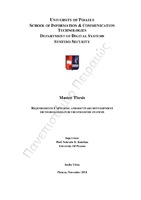Requirements capturing and software development methodologies for trustworthy systems

Προβολή/
Θεματική επικεφαλίδα
Software engineering ; Computer software -- Reliability ; Computer software -- Quality control ; Computer software -- DevelopmentΠερίληψη
In this Master's thesis, the concept of information systems trustworthiness will be covered, in terms of describing existing methodologies for collecting and documenting security requirements as well as describing how existing methodologies support the delivery of trustworthy systems. Moreover, this essay will employ a case study, in order to enforce the essay's outcomes on how to achieve trustworthy software. Trustworthiness is a characteristic that can be applied to any system that satisfies the desired level of trust by not failing. The systems that should possess such a property are mainly systems that manage sensitive records, critical infrastructure, etc. The capturing of a system's requirements is the process of discovering and identifying the system's stakeholders and their needs. A system's requirements are the features and qualities that a system should possess, and are extracted from the system's stakeholders (i.e. owners, users). Therefore, the identification of security requirements is of crucial importance for the achievement of the desired security goals, namely trustworthiness. With respect to security requirements, in order for a system to ensure that its security specifications are satisfied, security concerns must be taken into consideration in every phase of the software engineering lifecycle; namely, from requirements engineering to design, implementation, testing, and deployment. In order to increase users' trust in the systems they use, software defects must be reduced through. Following a systematic development methodology, during the software development process, the risk of not achieving the acceptable result, is reduced, if not eliminated, since software development methodologies impose a disciplined process upon software development.
Τίτλος Προγράμματος Μεταπτυχιακών Σπουδών
Τεχνοοικονομική Διοίκηση και Ασφάλεια Ψηφιακών ΣυστημάτωνΤμήμα
Σχολή Τεχνολογιών Πληροφορικής και Επικοινωνιών. Τμήμα Ψηφιακών ΣυστημάτωνΑριθμός σελίδων
47Γλώσσα
ΑγγλικάΣυλλογή
Εκτός από όπου διευκρινίζεται διαφορετικά, το τεκμήριο διανέμεται με την ακόλουθη άδεια:
Attribution-NonCommercial-NoDerivatives 4.0 Διεθνές
Attribution-NonCommercial-NoDerivatives 4.0 Διεθνές
Σχετικές εγγραφές
Προβολή εγγραφών σχετικών με τίτλο, συγγραφέα, δημιουργό και θέμα.
-
Ο ρόλος του λογισμικού ανοικτού κώδικα στην ηλεκτρονική διακυβέρνηση
Σπυράκης, Ευάγγελος (2014-04-14)Ελεύθερο λογισµικό είναι το λογισµικό το οποίο δίνει σε όλους την ελευθερία να το χρησιµοποιήσουν, να το διανείµουν, να το µελετήσουν, να το βελτιώσουν και να το αναδιανείµουν. Η αποδοχή και χρήση του ΕΛΛΑΚ σε όλο τον ... -
Ασφαλή συστήματα κινητών πρακτόρων
Κοτζανικολάου, Παναγιώτης Ι. (Πανεπιστήμιο Πειραιώς, 2003-01)Με την εξέλιξη της επιστήμης της πληροφορικής έχουν προταθεί διάφορες τεχνολογίες απομακρυσμένης επικοινωνίας και υπολογισμού για την υποστήριξη των κατανεμημένων συστημάτων: από κλήσεις απομακρυσμένων διαδικασιών, ... -
Ανάλυση απαιτήσεων στη διοίκηση έργων ανάπτυξης πληροφοριακών συστημάτων
Ζήσης, Δημήτριος Ν. (2013-12-19)Η Ανάλυση Απαιτήσεων είναι το πρώτο στάδιο στην ανάπτυξη ενός έργου πληροφορικής και αποτελεί κρίσιμο παράγοντα για την επιτυχία του . Σύμφωνα με τον Laplante η Ανάλυση Απαιτήσεων «είναι ένας κλάδος της μηχανικής λογισμικού ...


